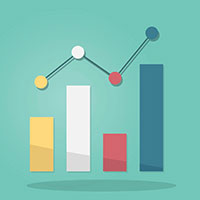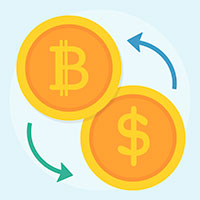Foreign exchange trading (also known as forex or FX trading) involves the speculation on currency prices exchanging on a global marketplace (the forex market). Forex markets are the largest and most liquid asset markets in the world with an average daily trading volume of $6.6 trillion. Currencies are important because they allow us to buy goods and services locally and internationally, as they are exchanged when trading on the forex market or conducting business.
The market is open 24 hours a day, five and a half days a week across almost every time zone, and currencies are traded worldwide in the major financial centres of London, New York, Frankfurt, Hong Kong, Paris, Sydney Singapore, Tokyo, and Zurich.
An overview of forex markets
The FX market is where currencies are traded. It is the only nonstop trading market in the world. Previously, the forex market was dominated by institutional firms and large banks, which acted on behalf of clients. However, the forex market has become more retail-oriented in recent years with traders and investors now participating.
It’s important to note that there are no physical buildings that function as trading venues for the markets. But instead, it is a series of connections made through trading terminals and computer networks.
Currencies are traded electronically in OTC markets (over the counter) which means that all transactions take place via computer networks.
Where is forex traded?
There are three different types of markets for trading forex: spot markets, forwards markets, and futures markets. Traders are usually trading the spot market where they can buy and sell commodities or currencies, among many other instruments, for immediate delivery.
- Trading in the spot market. The spot market is where you can buy and sell currencies based on their trading price. That price is determined by supply and demand and is calculated based on several factors, including current interest rates, economic performance, sentiment towards current political situations locally and internationally, and how the future performance of one currency against another is perceived. A finalised deal is also referred to as a spot deal.
- Forwards and futures markets. A forward contract is an agreement between two parties to buy a currency at a future date and at a predetermined price in the OTC markets.
- How to start trading forex. The first step to forex trading is to educate yourself on how the market operates. The next step is to develop a trading strategy based on your finances and risk tolerance. And last of all, you should open a brokerage account. It is easier than ever to set up and fund a forex account online and start trading currencies. Remember, all trading involves risk and it is possible to lose all your capital. Read on for more information about starting your trading journey.
Learn about forex
To trade effectively, it’s essential to get a forex education as forex trading requires specialised knowledge. There are several online courses available for beginners as well as websites, books and other resources that you can make use of to learn about forex trading.
- Open a brokerage account. You will need to open a forex trading account with a brokerage to get started with forex trading. For beginner traders, it is a good idea to open a micro forex trading account that will allow you to make small trades. Trading with small amounts will allow you to put some money on a trade, but your losses will be very small if your trade goes in the wrong direction.
- Develop a trading strategy. It’s important to develop a successful trading strategy and put it into action. Having a trading strategy will help you set yourself some guidelines and a road map for trading. A good trading strategy takes into account the amount of money that you are willing to put up for trading and the amount of risk that you can tolerate without risking more money than you can afford.
- Manage your emotions. Traders can be influenced by their emotions. The two main emotions to understand and keep under control are fear and greed. Don’t confuse caution with fear. Trade carefully using logic and reason. Fear can ruin your trading by holding you back from making a trade.
When people feel greedy or fearful, this may be when they’re more likely to make mistakes. Greed can make you remain in a trade when you had planned to exit. These trades may not turn out well, just when you thought the trade was going well.
Don’t allow the results of a few trades to affect your trading strategy and approach in general. Stick to what you have planned and use your trading journal to plan your next trades
Final thoughts
Just remember that it’s important to have an understanding of the foreign exchange markets and methods for forex trading. That way, you can better manage your risk, make winning trades, and set yourself up for success in your trading journey.
 For active traders and investors, mastering the art of trading volatility is a crucial skill. Volatility, in financial terms, refers to the extent to which asset prices fluctuate over time. High volatility markets experience rapid price swings...
For active traders and investors, mastering the art of trading volatility is a crucial skill. Volatility, in financial terms, refers to the extent to which asset prices fluctuate over time. High volatility markets experience rapid price swings... The global financial market operates as a dynamic ecosystem, where understanding the connections between different market movements can provide invaluable insights for forecasting...
The global financial market operates as a dynamic ecosystem, where understanding the connections between different market movements can provide invaluable insights for forecasting... The forex market, also known as the foreign exchange market, stands as the largest and most traded financial market globally. FXTM is committed to equipping our clients...
The forex market, also known as the foreign exchange market, stands as the largest and most traded financial market globally. FXTM is committed to equipping our clients... Cryptocurrency trading has rapidly grown into a bustling and dynamic market that attracts traders from around the world. With the potential for significant profits...
Cryptocurrency trading has rapidly grown into a bustling and dynamic market that attracts traders from around the world. With the potential for significant profits... The year 2023 has been a landmark period for the international broker Octa (formerly known as OctaFX), characterized by significant achievements and substantial contributions...
The year 2023 has been a landmark period for the international broker Octa (formerly known as OctaFX), characterized by significant achievements and substantial contributions...